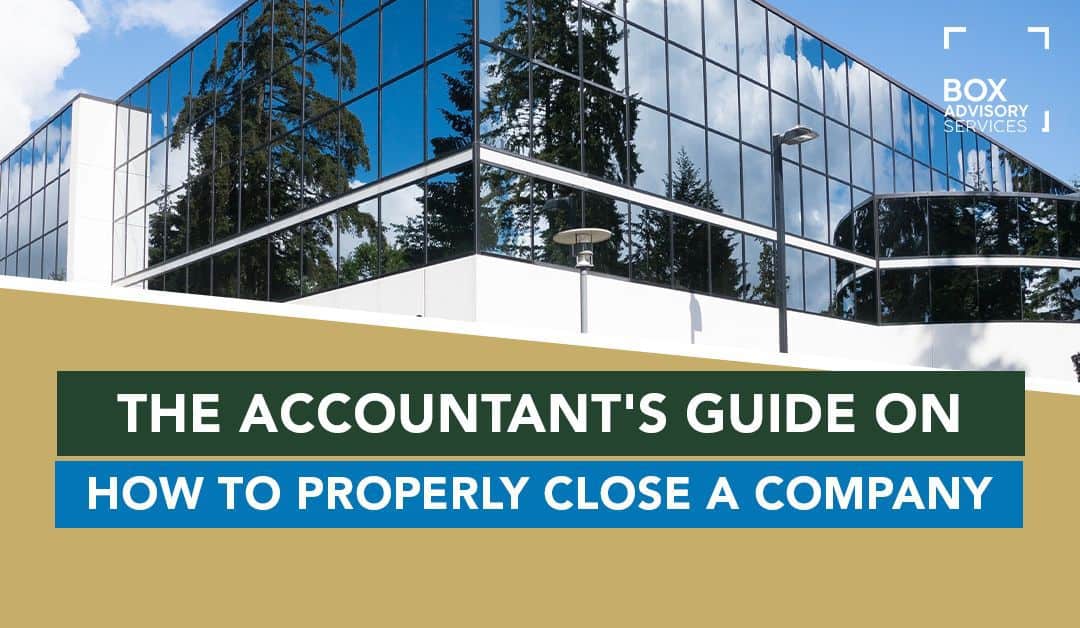
BY
|
The Accountant’s Guide on How to Close a Company
The last thing that any business owner wants to think about is closing their company. However, considering the worldwide pandemic and how tough the last two years have been on our economy, it has become an inevitable consideration for many business owners.
Unfortunately, in the event that this occurs, the process is not as simple as just closing its doors. There are several options available, and each one has its own procedural requirements.
So, to help you navigate the process we’ve put together an accountant’s guide on how to close a company, which will explain each closure option and the necessary steps that follow.
How To Close a Company: Your Options
Closing your business may not have been part of your exit strategy, but depending on your circumstances, it may be the safest route to take where the business is not making enough money to keep going, and there is no one interested in buying the business.
Closing your company doors essentially means that you’re selling your business assets, paying off outstanding debts and hopefully walking away with some surplus cash.

There are three different ways a business owner can close a company:
- Voluntary deregistration
- Liquidation/External Administration
- Wind up a solvent company
Voluntary Deregistration: What Are Your Legal Obligations?
Voluntary deregistration is the most common procedure used to close a company. Provided that all the business owners and shareholders of the company agree to voluntarily deregister the company, it’s quite straightforward and cost-effective to close your company this way.
Besides the shareholder’s consent, a company can only apply to be voluntarily deregistered if:
- it’s no longer carrying out business (or trading),
- the company assets are valued at less than $1,000,
- it no longer has outstanding debts and is solvent,
- it’s not a party in any legal proceedings,
- the company has paid all mandatory fees and penalties under the Corporations Act 2001, and
- where applicable, it has cancelled its Australian Credit Licence (ACL) or Australian Financial Services Licence (AFSL).
If all the requirements for voluntary deregistration have been met, the company must seek the services of a lawyer or an accountant to draw up a Members Resolution – which is a legal document that declares that all the conditions for voluntary deregistration have been met.
Finally, you’ll have to send the Members Resolution along with the application form (Form 6010) to ASIC. Once the deregistration process is complete, your company will be considered closed or dissolved.
External Administration: Selling the Company’s Assets to Settle Debts When your Company is Insolvent
Declaring insolvency is the process of liquidating a business and paying all its debts.
When you declare your business as insolvent, it means that your company’s liabilities exceed its assets.
This occurs when your company owes money to creditors and there isn’t enough cash left to pay off all outstanding liabilities or other claims against your company. Usually, this happens when your company has been running at a loss for some time, or a large debt becomes due, and you don’t have the financial capacity to settle the debt.

In these instances, the Australian Securities and Investments Commission (ASIC) doesn’t allow you to apply for voluntary deregistration.
Instead, the company can be closed down through a process called voluntary liquidation (or administration). The process involves appointing an external administrator such as a liquidator to ensure that the creditors receive fair compensation for outstanding debts.
However, if you’re unable to afford a liquidator, one of two things can happen. Either a creditor will apply to a court to liquidate your company, or ASIC can initiate deregistration (where you haven’t paid your annual review fee).
Winding Up a Solvent Company: Members Voluntary Liquidation
Not all companies are able to close their businesses through an insolvency process. It may be that your assets still exceed your liabilities, but other variables have played a part in your decision to close your company.
If you would like to know more about the pros and cons of voluntary liquidation, please refer to this article: *insert link to liquidation article
If your company is solvent but doesn’t meet the requirements for voluntary deregistration, then the members can opt to wind up the company.
To wind up a company’s affairs, the company’s directors must declare the company’s solvency and pass a resolution to wind up the company. Similar to insolvent liquidation, an independent liquidator must be appointed to:
- realise (sell-off) the company’s assets,
- pay any liabilities,
- distribute surplus cash to the shareholders, and
- finalise the company’s tax affairs.
The difference between insolvent and solvent liquidation is that the liquidator doesn’t have to balance the interests of the creditors and that of the shareholders – there are enough assets to settle debt and pay shareholders. With insolvent liquidation, the liquidator must determine how to distribute the remaining assets fairly amongst the creditors (who won’t necessarily have their full debt settled).
Once the voluntary liquidation is complete, the liquidator can apply to ASIC to deregister the company.
After Closure: No Longer a Legal Entity and Business Records Must be Kept
Once a company has been wound up, liquidated and deregistered with ASIC, it ceases to exist as a separate legal entity. However, the company directors are required to hold onto the business records (including all financial statements, registers and other financial data) for a minimum of three years after the company has been deregistered.

Key Takeaways
Closing a company can be an intimidating process, especially if you’re unsure which route you should take: voluntary deregistration, insolvency liquidation, or voluntary winding up.
While we’ve provided a summary of the different ways on how to close a company, there are several aspects of each option that are relatively complex and require the services of a qualified accountant. For example, you’ll need to lodge a final tax return and Business Activity Statements with the Australian Taxation Office to finalise your tax obligations.
You’ll also need to cancel other tax registrations such as PAYG and GST. Beyond that, you’ll need to close all your business bank accounts and cancel your ABN with the Australian Business Register.
Seeking the experience of a professional in this field can help ease the worries of closing a company and ensure that all the correct steps and procedures are followed.
While Box Advisory Services Australia can guide you through the process of closing a company, our expertise extends beyond that too. Business owners and executives are often forced to make difficult decisions regarding their company’s finances.
Our business adviser team can help you find the best solutions for your business by providing expert advice on a wide range of issues, such as tax planning, accounting services, and financial management. We’re here to offer you peace of mind knowing that we have the knowledge and experience required to handle any situation with professionalism and precision.
Our team is dedicated to helping our clients achieve success in all aspects of their business through innovative strategies and proven methods.
If you need help with the decision on whether or not to close your company, or if you simply need support and guidance during the company closure procedure, get in touch with us today.
Disclaimer:
Please note that every effort has been made to ensure that the information provided in this guide is accurate. You should note, however, that the information is intended as a guide only, providing an overview of general information available to property buyers and investors. This guide is not intended to be an exhaustive source of information and should not be seen to constitute legal, tax or investment advice. You should, where necessary, seek your own advice for any legal, tax or investment issues raised in your affairs.



